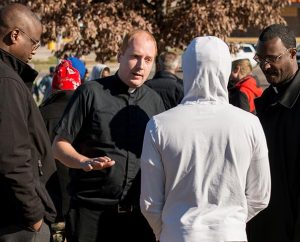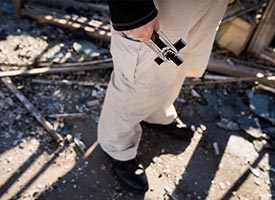By Paula Schlueter Ross (paula.ross@lcms.org)
FERGUSON, Mo. — It was a little tense when the Lutheran pastors arrived here on Tuesday, Nov. 25 — the day after the decision of the St. Louis grand jury in the Michael Brown Jr. case was announced and some protesters had turned angry and violent, setting more than 20 fires, trashing 10 police cars and damaging or looting more than a dozen local businesses.
On this day, as wisps of gray smoke still rose from the black, burned-out shell of a Family Dollar store a few blocks away, a man who claimed to be related to Brown was yelling, pacing and venting his rage to some two dozen people milling about: “You didn’t know him! … I can’t eat! I can’t sleep! … I’m sick of hearing about it!”

He can’t get a job, he said, because he’s African-American and related to Brown, and he has kids to feed, bills to pay! “What are you gonna do for me? How are you gonna help me?”
Another man, also upset, tried to explain: So many blacks, he said, don’t have the same opportunities as whites. “How long do you think you’re going to have a bunch of black, poor people in a group and nothing’s gonna happen? It’s gonna happen!”
“Hell is eternity, right?” another asked. “What’s the difference between hell and what we have right now, as black people?”
The six Lutheran Church—Missouri Synod pastors from the International Center and St. Louis-area congregations — and a vicar, who also serves a congregation as a student at Concordia Seminary, St. Louis — listened. Four of them, white, and the other three, black, slowly drew people into conversations about life, family and God a few yards away from a church sign that read “We pray for peace on earth with love,” with yellow “Police line do not cross” tape draped across it.
Two hours later, when the pastors left, no one was yelling; the mood was one of calm, peace.
And the Rev. Dr. Willie Stallworth, pastor of Unity Lutheran Church in East St. Louis, Ill., had in his possession the name and phone number of the man who had been the angriest, loudest protester.
“I’m going to follow up with him,” Stallworth said, “to visit in a more intimate way with him” and to give him “the opportunity to not only open up, but actually do some listening to some things that perhaps he hasn’t even heard before.”
That, in a nutshell, is ministry. That “ministry of presence,” notes the Rev. Steven Schave, director of LCMS Urban & Inner-City Mission, is important, especially “to bring Christ where there is unrest, division and lack of hope. … We can’t be on the sidelines, even if it is gritty and challenging. An immediate response is needed” to everyone: residents, business owners and police officers alike.
Stallworth — who said “our church looked so good” in Ferguson, represented by both black and white pastors serving together — puts it this way: “We took the church to the people rather than always trying to draw the people to the church.”
‘Raw pain, anger, emotion’
Vicar Chris Chandler, who serves Immanuel Lutheran Chapel, St. Louis, acknowledged that “what we heard when we first arrived on the scene in Ferguson was pain. Raw pain. Raw anger. Raw emotion.”
As clergy, he said, “we ought to have somewhat of a comfort level with pain and hurt, you know, because we deal with it in our congregations with our people. … We really just need to hear it. We might not understand it all … but we need to be a listening ear and hear the pain.”
That sentiment is shared by the Rev. John Lewis, who is in his second year of serving St. Matthew Lutheran Church, Walnut Park, Mo. Lewis grew up as a member of the congregation, attended its school and served as the school’s principal for 14 years before he entered Concordia Seminary’s Specific Ministry Pastor program.
“You could feel the tension,” he said of arriving in Ferguson, but “sometimes you have to let people vent.”
Those representing the church, he said, often “need to allow someone else to talk, and listen, and then be able to provide words of comfort.”
That happened in Ferguson, Lewis said, but, he added, “it’s going to take more than one day.”
The most vocal protester that day, he said, “really did have an opportunity to speak to someone that he felt was listening and respected him as a person. That’s what we’re really looking at now — individuals. Hurting souls that are part of a larger community.”
Protesters this time — after the grand jury decision — “were much more passionate and angry than they were in August,” when Brown was shot, acknowledged the Rev. Ross Johnson, director of LCMS Disaster Response, who had visited Ferguson back then, too.
But that’s all the more reason to be there, he said: “People need to see that the church is present in times of turmoil. God doesn’t call Christians only to what’s easy — He calls us to be His ambassadors in the midst of the storms and crises of the world,” bringing “a gentle voice to turn away wrath,” he added, referencing Proverbs 15:1.
‘It’s already racial’
Towona Jackson, who has lived in Ferguson for six years, said she moved there because it was peaceful and safe, and she hates what’s happened to her community. The problem, she says, is bigger than Michael Brown.
“A lot of people want to say that it’s not racial, or you’re making it racial,” she told Reporter. “No, it’s already racial, it’s been racial. There’s a problem.” History “keeps repeating itself,” she said, citing the sometimes-violent Civil Rights Movement in the ’50s and ’60s and the 1992 Los Angeles riots triggered by the police beating of Rodney King.
But, she added, violence and destruction is “not the way to get attention.”
She considers the grand jury announcement at 8 p.m. as a sort of “setup for failure.” If it had been made in the morning, she said, “a lot of people might have been at work and it would have been a whole different situation.”
She also believes blacks are treated differently than whites in American society. For example, policemen, she said, seem to “shoot to kill” blacks, but “shoot to injure” whites.
According to Jackson’s son, Julius, 20, “half of [the protesters] probably don’t even care about” Michael Brown. “They’re just in it for the looting and their own benefit.”
Julius said “it’s just crazy” that he and his friends can no longer visit some local businesses — such as Little Caesars Pizza — because they were burned down by angry protesters in the latest rampage.
He has a message for them: The violence isn’t hurting those you’re trying to hurt. “It’s just hurting us.”
The Rev. Mark Koschmann, assistant pastor at Chapel of the Cross Lutheran Church, St. Louis, said being among the Ferguson protesters “definitely opened my eyes to their frustration” and he believes the anger “is larger than one incident — it’s just a symptom of some real deep hurt and rawness.
“As a white person, I think it’s important to be with people and be honest about the real tension and say, ‘Yeah, there is a racial divide, even in 2014.’ “
Koschmann believes that the “dynamics that were taking place” between whites and blacks in the ’50s and ’60s “are still very much with us here today. And so, how do we share the love of Christ when we also have to call out the sin of racism and the structures that can make people feel that everything is against them?”
The answer, he says, is to “work together [to] form relationships with people so you get a better sense of what [their] everyday life is, and then you’re actually able to provide human, physical relief” as well as proclaim “the lasting hope that we have in Christ.”
‘Everyone needs Jesus’
The Rev. Adam Filipek, pastor of Salem Lutheran Church, Black Jack, Mo., agrees: “Everyone needs Jesus,” he said, “and we’re here to give Him to them, both body and soul.”
As a way of providing that in Ferguson — where in the Canfield Green apartments area, site of the Michael Brown shooting, there is a majority of black residents (a third are headed by single mothers), an annual income range of $24,000 to $39,000 and an unemployment rate as high as 20 percent — Synod leaders and local congregations are making a plan to open a permanent ministry to “rebuild hope and trust.”
The “Hope Center,” as it is being called, will likely offer free groceries, job training, after-school tutoring, character-building and DARE programs, and town-hall meetings as well as Bible studies, pastoral counseling and transportation to LCMS churches when it opens next year.
“After all of the bad news has been told, and the media hype is long gone, this Hope Center can offer long-term solutions to very complex problems,” notes Schave in the project’s ministry plan.
“The news coverage would have us believe that Christ is not in Ferguson, Mo. We will make it our mission to show the world: yes, He is.”
Posted Nov. 29, 2014 / Updated Nov. 30, 2014
